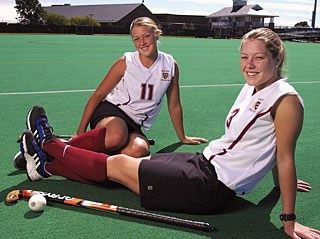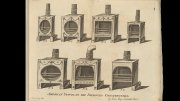Last fall, the Harvard field hockey squad was locked in a scoreless tie with Boston University. Though the teams had similar national rankings (Harvard eighteenth, BU seventeenth) the Crimson dominated play, outshooting the Terriers 17-2 and holding an 11-2 edge in penalty corners. Yet nothing went in the goal. Then, with only 89 seconds left to play in regulation, Kate McDavitt '04, Harvard's leading scorer, ripped a hard shot from the left side. Her younger sister, Jen McDavitt '06, tipped the ball over the sprawling BU goalie and into the net for a 1-0 victory. Moments later, the announcer proclaimed the goal and assist, booming out: "McDavitt to McDavitt."
 |
| Stickhandling sisters Jen McDavitt '06 (left) and Kate McDavitt '04 put down the equipment and relax for a moment on the synthetic turf of Jordan Field. |
| Photograph by Stu Rosner |
That was a dramatic score, but hardly the only time the talented sisters have linked up to bedevil Harvard's opponents. This September, for example, Jen and Kate scored the second and third goals, respectively, in a 3-2 upset of eleventh-ranked Connecticut, Harvard's first victory over the Huskies since 1991. Both sisters are usually on the field for the whole gametwo 35-minute halves. "We work well together," says Jen, a midfielder. "We know each other's styleswe know where to go and how hard to hit the ball. Even if Kate is double-teamed, I'm confident she'll make something happen." Kate, who plays center forward, adds, "I always feel that Jen trusts me a lot more with the ball. If I make a cut [a change in running direction to free herself from a defender], I'm almost 100 percent positive I'm going to get the ball from her."
The sisters are part of a veteran Crimson squad that lost only two players to graduation. "This is by far the most talented Harvard team I have had, from one to 22," says head coach Sue Caples, now in her sixteenth season. (The field hockey roster has 22 players.) "We have depth," Caples says. "You are bound to have injuries, so you need people who can step up."
Kate McDavitt is a team tri-captain, along with two fellow seniors; any one of them could win Ivy League Player of the Year honors. Goalkeeper Katie Zacarian was Second Team all-Ivy last fall; she started all 18 games and led the league with eight shutouts and a 1.26 goals-against average. "Katie is aggressive, confident, and fearless in goal," Caples says. "She takes control of the situation, and reads the play and angles well." Back Jennifer Ahn was a unanimous First Team all-Ivy selection in each of the past two seasons and last year led the team in assists. "Jen plays a very attacking sweeper positionshe starts the attack," Caples says. "She also plays great defense, with exceptional footwork and balance. She makes things look effortless, she is so graceful on the field."
Harvard hopes to dethrone Princeton, which has won eight of the last nine Ivy titles outright, sharing the ninth (in 1999) with Brown, and is 59-1 in Ivy contests since 1994. After 15 seasons, however, Tiger head coach Beth Bozman has decamped for Duke, and seven Princetonians graduated last June, including German wunderkind Ilvy Friebe, a two-time Ivy League Player of the Year.
Harvard is tiring of the runner-up role and the long drought in league titles. The Crimson shared the Ivy title with three teams in 1991 and last won it outright in 1990. They finished second in 2000 and 2002, both times winning NCAA bids. Last year, in the NCAA's first round, Michigan State beat the Crimson, 4-3, in Cambridge even though Harvard dominated the second half, outshooting the visitors, 20-2. "We're going to win [the Ivy title] this year," Kate McDavitt declares. Jen adds, "There's no other option."
To do this, the team will need to convert lots of penalty corners, which lead to about half the goals scored in field hockey. Umpires award a penalty corner when opponents commit certain infractions in the vicinity of their own goal. These might include obstructing an attacker with one's stick or kicking the ball. A skillful forward like Kate McDavitt makes it her business to draw penalty corners by doing things like knocking the ball off a defender's foot, causing an involuntary kick.
When the official whistles a penalty corner, the defending side can put only a goalkeeper and four defenders on their half of the fieldand those four must stay behind the back-line until the attacking side puts the ball in play. "You should score," says Jen McDavitt. Fortunately for Harvard, says Kate, "We have a great corner striker." That would be Liz Andrews '04. On a penalty corner, Harvard tries to feed the ball to Andrews, who will then uncork a powerful shot. She is "dangerous," Kate declares. In last year's NCAA match against Michigan State, Andrews slammed in two of Harvard's three goals.
The overall top Crimson scorer was Kate McDavitt, whose 34 points were good for third in the Ivy League. "Kate has very good hands, and a natural instinct around the goal," Caples says. "She sees the field well and has an innate passing ability." After a strong freshman campaign, Kate missed her sophomore season with knee problemscartilage damage, probably stemming from overuse. Following a year off plus injections and other treatment, the condition stopped deteriorating. "I figured I could suck it up for a couple more seasons," she says; her knees obviously did not prevent her from all-League play last fall.
Jen broke in with a bang. Last year she was the Ivy League Rookie of the Year, only the third Harvard player to win that honor and the first since Francie Walton '94 in 1990. As a midfielder, Jen is a transition player who can also play forward when Harvard needs some extra scoring punch. "She's very versatile, and has great speed and stickwork," Caples says. "Jen's speed, strength, and finesse make her very difficult for opponents to mark. She is a workhorse and she makes things happen."
The McDavitt clan is athletic: father Fran played several sports and has run three marathons, while mother Ellen was a high-school field hockey and softball player. Older sister Tina also excelled at field hockey; she captained her BU squad and now coaches at Holy Cross. When the McDavitts were children, an aunt bought a bin of field hockey sticks at a flea market for 25 cents and the three girls were literally off and running. "We'd play on hard sand on the beach at Marshfield," Kate says. "Mom and Dad would sometimes jump in."
The youth program in their hometown of Walpole, Massachusetts, formed the McDavitts into the fine players they became. "It starts in fifth grade there," says Jen. "Most schools don't offer field hockey until high school, or seventh grade at the earliest." Under coach Penny Calf, Walpole High School won a slew of state championships throughout the 1990s. Both sisters played for three state-champion teams; Jen was a first-team national all-American and Kate was selected for the under-16 national team.
The McDavitts do have off-field lives. Jen draws, paints, sews, and makes some of her own dresses. She plans to concentrate in visual and environmental studiesa rare choice for a varsity athlete, since afternoon studio time and team practices usually conflict. Government concentrator Kate may study in Europe next year, or possibly work in management consulting. For now, however, they are enjoying their last sororal season together on the field and at the Collegewhere, some evenings, Jen walks from Adams House down to Leverett to eat dinner and talk things over with Kate, McDavitt to McDavitt.
~Craig Lambert





